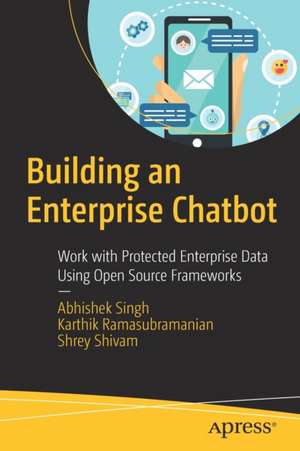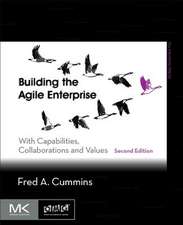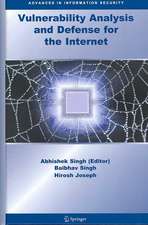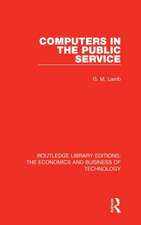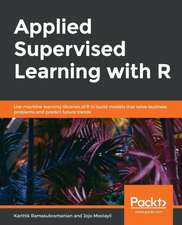Building an Enterprise Chatbot: Work with Protected Enterprise Data Using Open Source Frameworks
Autor Abhishek Singh, Karthik Ramasubramanian, Shrey Shivamen Limba Engleză Paperback – 13 sep 2019
Explore the adoption of chatbots in business by focusing on the design, deployment, and continuous improvement of chatbots in a business, with a single use-case from the banking and insurance sector. This book starts by identifying the business processes in the banking and insurance industry. This involves data collection from sources such as conversations from customer service centers, online chats, emails, and other NLP sources. You’ll then design the solution architecture of the chatbot. Once the architecture is framed, the author goes on to explain natural language understanding (NLU), natural language processing (NLP), and natural language generation (NLG) with examples.
In the next sections, you'll design and implement the backend framework of a typical chatbot from scratch. You will also explore some popular open-source chatbot frameworks such as Dialogflow and LUIS. The authors then explain how you can integrate various third-party services and enterprise databases with the custom chatbot framework. In the final section, you'll discuss how to deploy the custom chatbot framework on the AWS cloud.
By the end of Building an Enterprise Chatbot, you will be able to design and develop an enterprise-ready conversational chatbot using an open source development platform to serve the end user.
What You Will Learn
- Identify business processes where chatbots could be used
- Focus on building a chatbot for one industry and one use-case rather than building a ubiquitous and generic chatbot
- Design the solution architecture for a chatbot
- Integrate chatbots with internal data sources using APIs
- Discover the differences between natural language understanding (NLU), natural language processing (NLP), and natural language generation (NLG)
- Work with deployment and continuous improvement through representational learning
Who This Book Is For
Data scientists and enterprise architects who are currently looking to deploy chatbot solutions to their business.
Preț: 307.08 lei
Preț vechi: 383.85 lei
-20% Nou
Puncte Express: 461
Preț estimativ în valută:
58.77€ • 63.81$ • 49.36£
58.77€ • 63.81$ • 49.36£
Carte disponibilă
Livrare economică 01-15 aprilie
Preluare comenzi: 021 569.72.76
Specificații
ISBN-13: 9781484250334
ISBN-10: 1484250338
Pagini: 295
Ilustrații: XXII, 385 p. 102 illus.
Dimensiuni: 155 x 235 x 27 mm
Greutate: 0.57 kg
Ediția:1st ed.
Editura: Apress
Colecția Apress
Locul publicării:Berkeley, CA, United States
ISBN-10: 1484250338
Pagini: 295
Ilustrații: XXII, 385 p. 102 illus.
Dimensiuni: 155 x 235 x 27 mm
Greutate: 0.57 kg
Ediția:1st ed.
Editura: Apress
Colecția Apress
Locul publicării:Berkeley, CA, United States
Cuprins
Chapter 1: Processes in the Banking and Insurance Industry.- Chapter 2: Identifying the Sources of Data.- Chapter 3: Mining Intents from the Data Sources.- Chapter 4: Building a Business Use-Case.- Chapter 5: Natural Language Processing (NLP).- Chapter 6: Building Chatbots Using Popular Platforms.- Chapter 7: Chatbot Platforms.- Chapter 8: Chatbot Integration Mechanism.- Chapter 9: Deployment and Continuous Improvement Framework.
Notă biografică
Abhishek Singh is on a mission to profess the de facto language of this millennium, the numbers. He is on a journey to bring machines closer to humans, for a better and more beautiful world by generating opportunities with artificial intelligence and machine learning. He leads a team of data science professionals solving pressing problems in food security, cyber security, natural disasters, healthcare, and many more areas, all with the help of data and technology. Abhishek is in the process of bringing smart IoT devices to smaller cities in India so that people can leverage technology for the betterment of life.
He has worked with colleagues from many parts of the United States, Europe, and Asia, and strives to work with more people from various backgrounds. In 7 years at big corporations, he has stress-tested the assets of U.S. banks at Deloitte, solved insurance pricing models at Prudential, and made telecom experiences easier for customers at Celcom, and core SaaS Data products at Probyto. He is now creating data science opportunities with his team of young minds.
He actively participates in analytics-related thought leadership, authoring, public speaking, meetups, and training in data science. He is a staunch supporter of responsible use of AI to remove biases and fair use of AI for a better society.
Abhishek completed his MBA from IIM Bangalore, a B.Tech. In Mathematics and Computing from IITGuwahati, and a PG Diploma in Cyber Law from NALSAR University, Hyderabad.
Karthik Ramasubramanian has over seven years of practice and leading Data Science and Business Analytics in Retail, FMCG, E-Commerce, Information Technology for a multi-national and two unicorn startups. A researcher and problem solver with a diverse setof experience in the data science lifecycle, starting from a data problem discovery to creating a data science prototype/product.
On the descriptive side of data science, designed, developed and spearheaded many A/B experiment frameworks for improving product features, conceptualized funnel analysis for understanding user interactions and identifying the friction points within a product, designing statistically robust metrics and visual dashboards. On the predictive side, developed intelligent chatbots which understand human-like interactions, customer segmentation models, recommendation systems, identifying medical specialization from a patient query for telemedicine, and many more.
He actively participates in analytics related thought leadership, authoring blogs & books, public speaking, meet-ups, and training & mentoring for Data Science.
Karthik completed his M.Sc. in Theoretical Computer Science at PSG College of Technology, India, where he pioneered the application of machine learning, data mining, and fuzzy logic in his research work on the computer and network security.
Shrey Shivam extensive experience in leading the design, development, and delivery of solutions in the field of data engineering, stream analytics, machine learning, graph databases, and natural language processing. In his seven years of experience, he has worked with various conglomerates, startups, and big corporations and has gained relevant exposure to digital media, e-commerce, investment banking, insurance, and a suite of transaction-led marketplaces across music, food, lifestyle, news, legal and travel.
He is a keen learner and is actively engaged in designing the next generation of systems powered by artificial intelligence-based analytical and predictive models. He has taken up various roles in product management, data analytics, digital growth, system architecture, and full stack engineering. In theera of rapid acceptance and adoption of new and emerging technologies, he believes in strong technical fundamentals and advocates continuous improvement through self-learning.
Shrey is currently leading a team of machine learning & big data engineers across the US, Europe, and India to build robust and scalable big data pipelines to implement various statistical and predictive models. Shrey has completed his BTech in Information Technology from Cochin University of Science Technology, India.
He has worked with colleagues from many parts of the United States, Europe, and Asia, and strives to work with more people from various backgrounds. In 7 years at big corporations, he has stress-tested the assets of U.S. banks at Deloitte, solved insurance pricing models at Prudential, and made telecom experiences easier for customers at Celcom, and core SaaS Data products at Probyto. He is now creating data science opportunities with his team of young minds.
He actively participates in analytics-related thought leadership, authoring, public speaking, meetups, and training in data science. He is a staunch supporter of responsible use of AI to remove biases and fair use of AI for a better society.
Abhishek completed his MBA from IIM Bangalore, a B.Tech. In Mathematics and Computing from IITGuwahati, and a PG Diploma in Cyber Law from NALSAR University, Hyderabad.
Karthik Ramasubramanian has over seven years of practice and leading Data Science and Business Analytics in Retail, FMCG, E-Commerce, Information Technology for a multi-national and two unicorn startups. A researcher and problem solver with a diverse setof experience in the data science lifecycle, starting from a data problem discovery to creating a data science prototype/product.
On the descriptive side of data science, designed, developed and spearheaded many A/B experiment frameworks for improving product features, conceptualized funnel analysis for understanding user interactions and identifying the friction points within a product, designing statistically robust metrics and visual dashboards. On the predictive side, developed intelligent chatbots which understand human-like interactions, customer segmentation models, recommendation systems, identifying medical specialization from a patient query for telemedicine, and many more.
He actively participates in analytics related thought leadership, authoring blogs & books, public speaking, meet-ups, and training & mentoring for Data Science.
Karthik completed his M.Sc. in Theoretical Computer Science at PSG College of Technology, India, where he pioneered the application of machine learning, data mining, and fuzzy logic in his research work on the computer and network security.
Shrey Shivam extensive experience in leading the design, development, and delivery of solutions in the field of data engineering, stream analytics, machine learning, graph databases, and natural language processing. In his seven years of experience, he has worked with various conglomerates, startups, and big corporations and has gained relevant exposure to digital media, e-commerce, investment banking, insurance, and a suite of transaction-led marketplaces across music, food, lifestyle, news, legal and travel.
He is a keen learner and is actively engaged in designing the next generation of systems powered by artificial intelligence-based analytical and predictive models. He has taken up various roles in product management, data analytics, digital growth, system architecture, and full stack engineering. In theera of rapid acceptance and adoption of new and emerging technologies, he believes in strong technical fundamentals and advocates continuous improvement through self-learning.
Shrey is currently leading a team of machine learning & big data engineers across the US, Europe, and India to build robust and scalable big data pipelines to implement various statistical and predictive models. Shrey has completed his BTech in Information Technology from Cochin University of Science Technology, India.
Textul de pe ultima copertă
Explore the adoption of chatbots in business by focusing on the design, deployment, and continuous improvement of chatbots in a business, with a single use-case from the banking and insurance sector. This book starts by identifying the business processes in the banking and insurance industry. This involves data collection from sources such as conversations from customer service centers, online chats, emails, and other NLP sources. You’ll then design the solution architecture of the chatbot. Once the architecture is framed, the author goes on to explain natural language understanding (NLU), natural language processing (NLP), and natural language generation (NLG) with examples.
In the next section, you’ll discuss the importance of data transfers using natural language platforms, such as Dialogflow and LUIS, and see why this is a key process for chatbot development. In the final section, you’ll work with the RASA and Botpress frameworks.
By the end of Building an Enterprise Chatbot with Python, you will be able to design and develop an enterprise-ready conversational chatbot using an open source development platform to serve the end user.
You will:
- Identify business processes
- Design the solution architecture for a chatbot
- Integrate chatbots with internal data sources using APIs
- Discover the differences between natural language understanding (NLU), natural language processing (NLP), and natural language generation (NLG)
- Work with deployment and continuous improvement through representational learning
Caracteristici
Concepts are explained using use-cases from the banking and insurance sector Deploys a complete in-house built chatbot using open source stacks Covers popular chatbot frameworks such as Microsoft LUIS and Google Dialogflow
